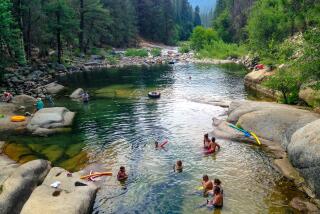Keeping Stress Out of Summer Holiday Plans
- Share via
If your plans to travel to Europe this summer have been dashed by fear of terrorist attacks and you’ve decided to see America first, there still may be some things you want to know about stress.
First, “try to remember what your purpose is for taking the trip,” said Stanley Weingart, a specialist in stress management and organizational behavior at USC’s business school.
Vacations are supposed to be fun and relaxing, he added, but “sometimes we lose sight of that.”
To help parents deal with stress and make the family vacation more pleasurable, Weingart offers a variety of suggestions.
Realistic Expectations
Leading the list is the development of realistic expectations. Often, Weingart said, families do not have an accurate picture of the problems that they will encounter on their vacations.
Because of lower gas prices, the declining value of the dollar and fears of terrorism, there will be a lot more people on the road this year, he said.
To cope with the increased traffic and the large crowds expected at national parks and other tourist areas, families need to start planning early. They need to get information and start building up a “data base,” one based on reality, he said.
For example, people who have not been to Yosemite National Park for 20 years tend to remember the way it was then, not the way it is now, jammed with long lines of people waiting to get in, he said.
To counter such problems, people should reserve campgrounds and do their planning well in advance, he said. “If I have a realistic outlook, the problem will be less when I get there,” Weingart said.
In planning a trip, families should ask themselves: What is the goal? “Is it to get away alone, or is it to promote family togetherness?” Whichever, you need to remember “you can’t have it all,” he said. “You need to realize that.”
Dealing With Children
Realistic expectations also include knowing what to expect from your children. Children have a short attention span, so you have to plan and do things with the children to occupy their time, he said.
“Going 400 miles with children in the car is not the same as going 400 miles by yourself,” he said.
Another thing parents can do is to set aside some time for themselves to relax, he said. “A vacation can really be work.”
If you plan to be in the car all day, try to think of things to do for relaxation, something physical, for both adults and children. Plan to make periodic stops so everyone can get out for a swim or a walk, he said.
And while driving, do relaxing things, like stretching, shoulder rolls and neck massages. “It’s amazing what a minute’s relaxation can do. You can actually arrive rested,” he said.
For those planning long trips, Weingart suggests that they take their time. “You can make getting there half the fun.” Instead of taking a four-day trip to see the Statue of Liberty, make it a six- or an eight-day trip. “Make the drive itself part of the real vacation.”
To do so, he recommends getting an early start each day. This avoids the heavier afternoon traffic and by 2 p.m. you can stop and get a room. Then the family will have time to go to historical monuments or other attractions.
“And again, this is part of the pre-planning of the trip,” he said. “But if you really want to go to New York City and spend time there, take a plane.”
Recounting the story of his cousin, whom he called a high-stress Type A personality, Weingart said some people can never relax.
His cousin, he said, came to Southern California on a vacation from New York. “He went to Knott’s Berry Farm, Disneyland and Tijuana all on the same day. That’s the way he lived his life, and he died at 54.
“What makes it a vacation is the free time, not having to do things on schedule.”
If you’re a Type A personality, it might be best to take off a couple of days to relax before starting on your vacation. “But it’s been my observation that people don’t wind down well in this period.”
Advising people to take one day to collect themselves and then leave on their vacation, Weingart said, “It’s my finding that people wind down in a different setting. They start to unwind and relax when the scene changes a little bit.
“The goal of the vacation is to relax and recuperate.
More to Read
Sign up for The Wild
We’ll help you find the best places to hike, bike and run, as well as the perfect silent spots for meditation and yoga.
You may occasionally receive promotional content from the Los Angeles Times.






